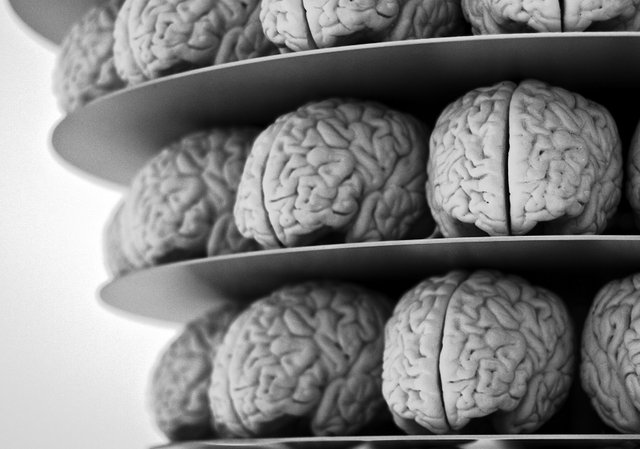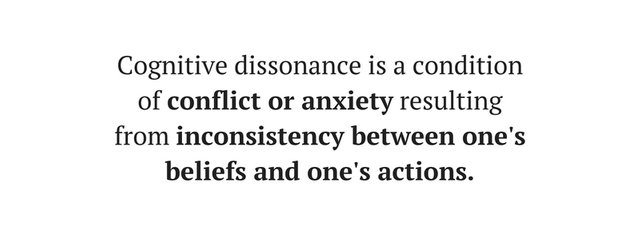The lies we tell ourselves - cognitive dissonance

You've been a smoker for years. You started because your friends smoked; you couldn't resist the peer pressure. Now you're smoking at least one pack a day, sometimes two.
Recently your health has taken a turn for the worse. That cough is getting rougher and you're out of breath climbing stairs. You visit your doctor who recommends you stop smoking.
You sign up for a program but after two weeks stop. Instead of admitting that you have an addiction and that quitting is hard, you tell yourself you enjoy smoking, and that it could be worse - your friends smoke far more.
Congratulations! You've just fallen victim to cognitive dissonance.

Were the tasks interesting and enjoyable?
In 1959 Leon Festinger performed an experiment where participants were informed that the experiment focused on "Measures of Performance". They were split into two groups: the first group was provided no introduction about the tasks they would be performing, whereas the second group was given an introduction by an experimenter who presented the tasks with a positive tone.
The tasks were, however, designed to be monotonous. Participants were asked to put spools on a tray with one handing, take them off, and put them back on again - for one-and-a-half hours. When they were finished, they spent the next thirty minutes turning 48 square pegs.
After the tests each participant was interviewed regarding how enjoyable the tasks were. From this point on, the experiment changes. Some participants were sent home: this was the control group. The remaining subjects were asked to take the place of the experimenter in giving the positive introduction to the next group of participants. Half of them were paid $20 to do this, while the other half per paid just $1.
The participants were again interviewed, with one of the questions asking whether they found the experiment enjoyable. You can see a video of the experiment in action below:
Both the control group and the group where participants were paid $20 rated the task negatively, indicating that they didn't find it enjoyable. The group that was paid $1, however, rated the task positively, indicating that they found it enjoyable.
Both the control group and the group paid $20 rated the task negatively - they didn't find it enjoyable; however, the group that was paid only $1 couldn't find any justification for doing the task. Instead of accepting that they were paid poorly to perform a boring task, they conclude that the task must have been enjoyable.
The fox and the grapes
Aesop is a storyteller believed to have live in ancient Greece between 620 and 564 BCE. He is credited with a number of fables, one of which is called "The fox and the grapes":
Driven by hunger, a fox tried to reach some grapes hanging high on the vine but was unable to, although he leaped with all his strength. As he went away, the fox remarked 'Oh, you aren't even ripe yet! I don't need any sour grapes.'
This is a classic example of cognitive dissonance. Instead of admitting his failure in obtaining the grapes, the fox rationalises that they are not worth having.
Cognitive dissonance on steemit
You've written a post on steemit. You've poured your heart and soul into the post and are ready to reap the rewards - you can feel the up-votes coming.
Twelve hours later your article has sadly only attracted a few up-votes and earned you a mere $0.04.

To resolve the dissonance between believing that your post is of high quality and deserves to trend against the reality that it received few up-votes, you tell yourself the timing was off, the system is rigged, and that whales aren't up-voting fairly.
What can we do?
Cognitive dissonance happens a lot. Any time you have conflicting thoughts that need resolving, cognitive dissonance is around the corner waiting to pounce.
Try to recognise when you feel uncomfortable making a decision. Stop and see if you can find the inner conflict.
Banner photo by Niel Conway used under the CC-BY-2.0 license. Changes were made to the original.
Other posts in the series:
This is a neat series, and I think "the lies we tell ourselves" represents one of the most important contributions of psychology. Have you read the work of confabulation in split brain patients?
Some patients have the tracts in between their two hemispheres severed (sometimes to prevent seizures), so the hemispheres no longer communicate well with each other. You can send visual information to particular sides of the brain, since the visual field is lateralized. Here is the classic experimental example: the right brain sees a snowy scene, while the left-brain sees a chicken leg. The patient is asked to choose between a few pictures that best relates to the scene that they saw.
One of choices relates to the snowy scene (a shovel) and one of the choices relates to the chicken leg (a chicken). If you now ask the patient to point to their choice, each hand points to a different symbol. The right hand (controlled by the left side of the brain) points to a chicken, and the left hand (controlled by the right side of the brain) points to a shovel. Now the cool part (that relates to cognitive dissonance). Language is also usually lateralized to the left side of the brain. If you ask the patient why he pointed to a shovel, the patient quickly makes up a story to explain their behavior (e.g. "well, you need a shovel to clean the chicken coup") even though that hemisphere had nothing to do with the behavior.
We're probably doing this rationalization all the time, but it takes an extreme example like this to make it so obvious!
Thanks for the compliments. I love that experiment. It must be so fascinating to see that happening in front of you. I noticed you're a neuroscientist - you should write posts about these things!
Making a new series Top 5 Psychology Gems I have featured you in it for today.
https://steemit.com/psychology/@carlidos/top-5-psychology-gems-new-series-8-27-16
hi i will be featuring this post today
Wow! Thanks! :)
Nice @bitcalm
Shot you an Upvote :)
Keep up the great work @bitcalm
Upvoted
vipassana meditation helps a lot in this kind of situations
Very thoughtful post! I didn't even think of this as a reason why people start blaming whales and the system when their posts aren't popular. Great work! Thanks for posting.
Thanks. It's one possible explanation.
Well written post @bitcalm! I thought the Festinger experiment illustrated the concept really well and I appreciated the video link.
Glad to see you're making a series on cognitive biases! Keep up the great work!
Great post!
Well stated and clear explanation